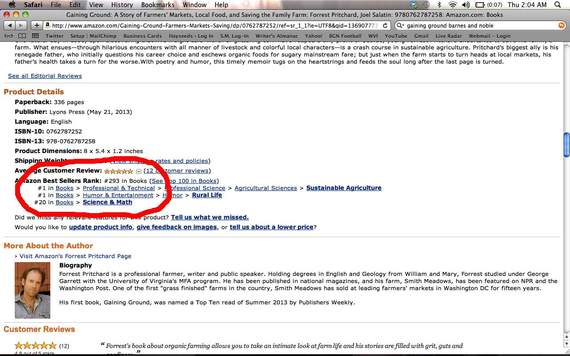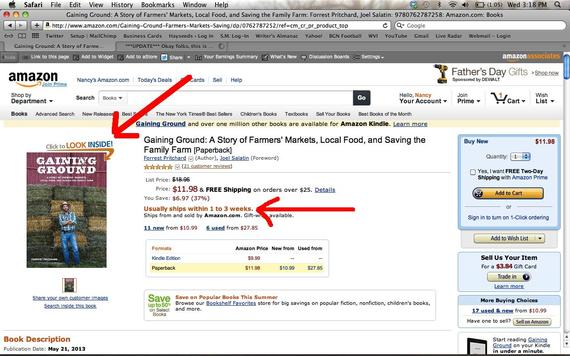7 Things Most Authors Don't Know About Amazon
When my first book debuted in 2013, I thought I had prepared for everything. My press had arranged media interviews, my inbox was percolating with signing events, and an avalanche of blog reviews was scheduled to coincide with the release date. I had read hundreds of 'first time author' advice columns, gleaning scores of important suggestions. With a mid-sized press and a limited budget, I felt as ready as I could possibly be.
But not one article underscored how phenomenally important Amazon is to the publishing industry, controlling the lion's share of sales, marketing and revenue. In hindsight, five minutes of Amazon research was usually worth an entire day of non-Amazon related wisdom. So if your resolution is to write a book in 2014, here's a list of 7 things I wish I had known before publication day, all focusing on that mysterious powerhouse simply known as Amazon.com.
1) Amazon is King
I'm as passionate about my local bookshops as the next writer, proudly attending signings at all of my area stores. Personal loyalties aside however, Amazon is the undisputed 800 pound simian of the publishing industry. Jeff Bezos' company currently accounts for 50 percent of ALL online book sales, and 60 percent of e-books. While I earnestly want my local book stores to thrive, authors would be wise to educate themselves about how Amazon operates. For example, did you know...
2) Amazon Can Release Your Title Ahead of Time
From time to time, Amazon has released video games and albums before their official release date. This is what happened with my book.
Imagine you're nervously awaiting your release date, and you've strategically coordinated media interviews and bloggers to publish reviews in conjunction with distribution day. Friends are taking you out for drinks, and your mom is flying in to celebrate. In the week leading up to the debut, all should be right in the world. Then you receive the e-mail: Amazon has released your book 10 days ahead of scheduled publication. Your perfect world comes crashing to a halt.
So what's the big deal? Well, it might have been a pipe dream all along, but your shot at making a best seller list just sailed out the window. To crack the New York Times list, for example, a book needs to sell about 5,000 copies in a single week. This is already a nearly impossible task for a first time author, made doubly so when the release date becomes a moving target. No need to fret, however. As it turns out...
3) Amazon's Rankings Don't Mean Much
I didn't know this before being published, but Amazon updates their sales rankings hourly. This is public information, found on any book's Amazon homepage under 'Product Details.' Out of something close to 10 million titles, each title is ranked on how well it is selling at that moment in time.
When I first checked my ranking a week before publication, Gaining Ground was sitting near #50,000. Out of 10 million books, that seemed like an extraordinarily positive number. But as it turns out, the ranking operates on a dramatic upward curve. A book ranked #50,000 to #100,000 might be selling 1 or 2 copies per day, but a book ranked #5,000 might be selling 30; quite a large difference. Moreover, #500 could be selling 150 copies, and #50 might be selling 300. My best overall ranking momentarily cracked the top 300 (see screenshot 1).
But for all the writers who never sniff the top 100, at least we know our book will be eternally "in-stock", waiting to be shipped at the click of a button. Right?
4) Amazon Can Sell Out
For my book Gaining Ground, the unexpected happened: At week 3, it was selling so well that Amazon sold out of copies. "What?!" I asked myself. "I thought the internet was this limitless space where products appeared out of the ether. How could a book possibly sell out?"
As it turns out, both Amazon AND my publisher underestimated its popularity. It took nineteen days before the title was available again, via a rushed second printing. For nearly three weeks, Amazon's screen read "Usually ships within 1 to 3 weeks" (see screenshot 2). A good problem to have? Sure. An incredibly frustrating problem to have? Absolutely. Speaking of frustrations...
5) Amazon's Category Placement Can Be Arbitrary
Besides a book's 'overall ranking' there are also rankings within categories. Category placements let customers track books within genres, allowing fans of, say, David Sedaris to discover other authors in the category of "Humor>Essays" or "Humor>Satire". Just so long as Me Talk Pretty One Day isn't accidentally categorized under "Self-Help>Dysfunctional Families" or "Psychology>Relationship Advice", everything should work out fine.
But this is exactly what happened in my case. For the first two weeks of publication, my book about saving our family's centuries-old livestock farm was placed in the "Gardening>Vegetables" category. I envisioned my cows standing in a pumpkin patch. What else could go wrong?
6) Cover Art and Prices Can Change Spontaneously
The last thing I ever expected: Inexplicably, the cover of my book was replaced with a long-discarded placeholder image (see screenshot 2 again). Enough said. And for those intent on tracking royalties and pricing, break out your abacus. Amazon's pricing fluctuates wildly, even from one day to the next. Gaining Ground has been priced as low as $10 a copy, and as high as $15 and change.
7) You Can Call Amazon. On The Phone.
This last revelation was perhaps the biggest shocker of all. For all its calculated automation, for all its impregnable corporate mystique, each time I had a problem with Amazon I got a live, breathing person on the other end of the line. After spending a few minutes corroborating that I was actually the author of my book, I was able to properly recategorize it (Sustainable Agriculture), reset the cover art, and determine how long it would be out of stock. Amazon's representatives were polite, knowledgable, and even had bonafide human names: Frank. Maria. Greg. The experience was totally surreal.
So if your New Year's resolution is to write the Great American Novel, then by all means, get started. But once you're finished, take time to get educated. While Amazon will (thankfully) never supplant our beloved independent bookstores, writers should ignore it at their own peril. Keep your friends close, and your Amazon closer.

